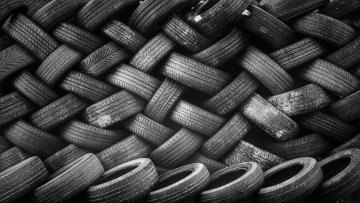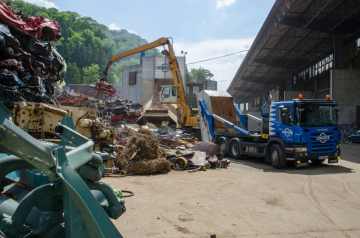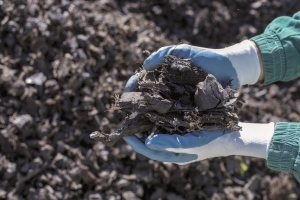In Germany, around half a million tonnes of end-of-life (EOL) tyres accumulate annually and only a small proportion is used as recycled material for the production of new tyres. Within the framework of ConCirMy, it is being investigated whether and how tyres can be optimised with regard to the goals of a circular economy without compromising on quality. A tool is being developed to provide information on environmental compatibility to various stakeholders in the supply chain which can be taken into account in purchasing decisions.

Recycling of EOL tyres
Although technologies for the recycling of used tyres are available, their use is still rather limited. Vehicle manufacturers are also interested in increasing this proportion - a motivation based, for example, on the End-of-Life Vehicles Directive, according to which 85% of end-of-life vehicles by weight must be reused or recycled and 95% must be recovered. These requirements are also important with regard to the development of new vehicles and their components, the pressure is increasing with the transformation to electromobility because some components are difficult to recycle.

Merging core system
The aim of the ConCirMy project is to develop a product configurator which informs users about the environmental impacts and other sustainability aspects of the product (raw materials used, possibilities of recycling or reuse) in the life cycle of the tyre and enables them to consider this information in their purchasing decisions. These can be accessed by different user groups situated at different levels in the supply chain - consumers, designers, recyclers - and taken into account in decision-making alongside other important factors such as functionality and cost.
Ultimately, the aim is to support the production and purchase of more sustainable products, the development of more environmentally friendly designs and the move towards recycling and reuse. The configurator acts as a unifying core system that makes specific information available to different actors in the supply chain. Technically, both the integrated environmental assessment of products and components in a product configurator for the end customer and the comparative implementation of different calculation approaches are new.
Socio-economic analyses are conducted in order to learn about consumer preferences and demand potentials for bio- and circular economy-based automotive components, including related sustainability aspects. Recommendations are derived for the various supplier groups of the targeted circular economy system. For the successful implementation of the circular system, business models are developed. Furthermore, the need for standards to support the development of the supply chain towards a circular economy is examined.
Results (Status June 2022)
For the analysis of the value chain, the process chain of tyre production from raw material to recycling technologies has been investigated and recycling possibilities and recovery routes of recyclates from tyres have been identified.
The research has shown that tyres are a highly complex product and that an established product classification at raw material level is not freely available. An important result of the project is also the development of a generic tyre model, i.e. an exemplary life cycle inventory, which serves as a basis for the product configuration.
The integrated sustainability assessment with life cycle assessment data from the Ecoinvent database has been integrated into a prototype and will now be tested and demonstrated. Furthermore, a cloud-based prototype was developed to support multidimensional sustainable monitoring of the product (a tire).In parallel to the technical developments, socio-economic analyses as well as single- and multi-stage surveys on acceptance factors were carried out, e.g. among private individuals, professionals of the tyre value creation system, vehicle fleet managers as well as leasing companies. They resulted in a variety of implications for ConCirMy's software solution. In addition, framework conditions and implementation barriers of circular public tyre procurement were identified and recommendations for action were formulated.

Interdisciplinary project consortium
CAS Software AG, Dechema e. V., the Department of Innovation Economics at the TU Berlin and the German Institute for Standardization (DIN) are working together on the "ConCirMy" project to develop an interconnected and sustainable assistance system. CAS brings expertise in software development and is developing the configurator in cooperation with all partners.
Dechema e.V. conducts market research on the product life cycle as well as on the current handling and recycling of used tyres in Germany and creates life cycle assessment studies which form the basis for evaluation of environmental impacts in the configurator tool.
Using socio-economic analyses, the Department of Innovation Economics at TU Berlin determines acceptance factors and demand potentials for sustainable automotive components, develops recommendations for the different players in the circular system, and develops business models for its successful implementation.
DIN reviews the project results with regards to potential standardization needs. For this purpose, an overview of existing norms and standards is prepared. After identifying the potential for standardization, necessary standardization activities will be initiated.
Publications
DIN SPEC 91474:2023-02 Data format for the exchange of LCA results for the configuration of modular variant-rich products
Krahtova, P., Simon, G. R. & Schulze, R.: The ConCirMy configurator informs about the sustainability aspects of products, Waste Management World (2023): https://waste-management-world.com/resource-use/the-concirmy-configurator-informs-about-the-sustainability-aspects-of-products
Project flyer of the funding measure (German / English) (March 2021)
The project flyers offer an insight into the contents and goals of the ReziProK projects and present first results in each case.
Project sheets of the funding measure (German) (August 2019)
The project sheets provide a brief overview of the individual projects and their goals.
Contributions to the ReziProK Transfer Conference in June 2022
Poster (German) (June 2022)
Presentation (German) (June 2022)
Picture credits: Imthaz Ahamed on Unsplash; pxhere; ©Drpixel - stock.adobe.com
